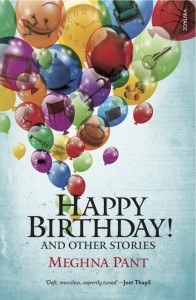Interview by Yayaati Joshi
You have been a financial journalist. Some would say that the nature of your job (the quantitative world of finance vis a vis the fictional world of storytelling) was at odds with writing fiction. Did you face any problems in writing fiction?
There was no great strife or crossover, rather a slow and steady pursuit of both business and creative writing. They seem like two disparate forms of writing; after all fiction is a subjective field, all about emotions and experiences; while finance and journalism are objective fields, based on data and facts. Yet, journalism techniques have come in handy for me while creating stories. It has taught me to write economically, within the bounds of reason, while keeping in mind what is interesting to a reader, and to pay careful attention to what’s going on in the world around me. It’s easy as a writer to shut myself from the world, so being a journalist forced me to keep seeing what’s out there.
Writing’s greatest problem is writing itself. It is a soul wrenching, gutting process. It is horror. It is beauty. It makes you mad. It makes you wise. It gives you freedom. It confines you. Really, it’s wonderful. Mostly.
As someone who studied Economics, Management and Finance (and not Creative Writing/English Literature), when did it occur to you that you wanted to be a fiction writer? Do you think you would have been a better writer had you studied literature?
I’ve been writing stories since I was nineteen, before I’d grasped what things adults are supposed to do with themselves. I’ve studied everything that institutions have to offer: business, law, history, medicine, economics, statistics, accounting; but the greatest lessons I’ve learnt are from life itself.
Writing, on one hand, involves the ability to write. And writing well comes from discipline, reading and loving the roll of words in your mouth. On the other hand, you have to be able to tell a good story. For this you have to live your life: experiment, experience, fail, fall, remember every little pain and every little joy, love, love again and always keep a diary.
Experiencing life does not require a degree.
In the Indian writing space, mass popularity and literary merit do not often go hand in hand. Writers who have sold millions of copies are sometimes criticised for poor content and pandering to the masses, and those with serious literary aspirations often get a short shrift when it comes to sales. As a writer, what are your thoughts on this?
If someone wants to spend hundred-rupees of their hard-earned money to read what a ten-year-old will be able to write better, they are doing only themselves a great injustice. Reading is meant to expand your horizons, not make you feel like you walked into juvenility.
I cannot tell you how many commercial fiction writers have told me that they spend only a month or two to write their book, and then sold that book for a hundred-rupees. Their ideology is that you become famous and a bestselling author with the minimum effort.
India is a land of historically great storytelling and this current state of affairs is abysmal.
As a literary fiction author I am and I will continue spending years of my life in perfecting that one story that will reveal a new truth or world to its reader. My responsibility lies with my writing, my publisher and my readers. If my story has reached its full potential, if I’ve become a better person through my art, if my publisher is making money out of my book, if my readers say that something in them shifted while reading my novel, that my characters have become their friends, that my epiphanies have echoed in their hearts, I am happy.
An oft-quoted grouse about Indian Writing in English is that the conversation between the characters doesn’t always ring true. For example, an auto-wallah talking to a passenger (in English) feels odd. The closet the writer can come to replicating the conversation—in English—is by simplifying what a non-English speaker is saying. In doing so, sometimes the effect of the conversation is marred, because even though all Indians don’t speak English, they do express complex ideas, the meanings of which can be lost in translation. Was this an issue for you?
Not at all.
What challenges did you face while working on your books? How did you overcome them?
Any serious writer faces challenges that are visceral, temporal and semantic. Writing is a perilous occupation; its silence, its noise, its precision and its instability can leave you distraught. So you recognise the hopelessness, the hold, the power, and you keep on writing.
Does a work of non-fiction feature in your writing plans?
I write non-fiction articles and I’ve been approached to write biographies, but my fiction leaves me no time to write a full-length non-fiction book.
Finally, can you share some words of advice for aspiring writers?
Don’t romanticise writing; it’s the toughest thing you’ll ever do.
Yayaati Joshi is a man with simple tastes and intense beliefs. Contrary to the bling associated with the capital city, he prefers the company of close friends, an engaging book or an Alfred Hitchcock movie. His placid demeanour is often mistaken for reticence; Yayaati is a self-proclaimed loner, whose recent pursuits include his foray as a budding writer. Yayaati blogs at http://rantingsofadelusionalmind.wordpress.com.






